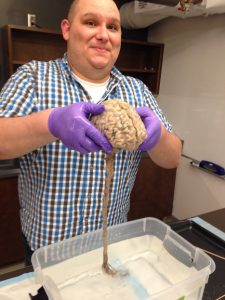
A new philosophy course for the Spring 2021 semester will explore Neuroethics. This course, developed by Assistant Professor Luis Favela, is not only new to UCF but is the first neuroethics course in the state of Florida. UCF students will have the unique opportunity to take a course not offered at any other university in the region.
Neuroethics is an interdisciplinary area concerned with moral issues associated with the mind sciences, especially neuroscience. Neuroethics has two main areas:
- The ethics of neuroscience, which concerns moral issues that arise from neuroscience findings and technology, and
- The neuroscience of ethics, which concerns what, if anything, can research in neuroscience tell us about morality.
After brief introductions to ethical frameworks (e.g., deontology, utilitarianism, etc.) and neuroscience (e.g., common methods such as neural imaging, etc.), this course will cover topics such as:
- cognitive enhancement,
- free will and responsibility,
- mind manipulation,
- mind reading and privacy,
- neuroscience and the law, and
- sexed brains.
“As long as there have been sciences of the mind, there has also been intersecting moral issues,” Favela notes. “Still, neuroethics is an especially important topic now due very real issues such as the increase misuse of cognitive-enhancing drugs (a.k.a. nootropics) among college students and existing brain-machine technologies like the Elon Musk-backed Neuralink. Accordingly, this course ought to be of interest to students from a variety of backgrounds and with a wide range of interests.”
The course is offered for undergraduate students as PHI4932 for undergraduate students and PHI5697 for graduate students. PHI4932 is open to all students in Junior standing who have taken PHI2010, and PHI5697 is open to all students with graduate standing. Students with questions can reach Favela at Luis.Favela@ucf.edu.